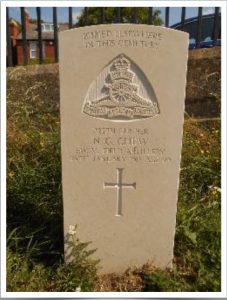265th (1st Welsh Howitzer) Brigade, Royal Field Artillery

Norman’s birth was registered in Stroud in the second quarter of 1887 but he was not baptised until March 1900 at the same time as his brothers Gerald, 16 and Albert, 15.
Norman Gilbert Chew was the youngest of six children born to Albert and Frances Chew. At the time of the 1891 Census the family were living on the Bath Road in Stroud where Albert was running an ironmongery business. He was 48 and from Stroud. His wife Frances was 37 and a Dubliner. The family were in a position to be able to employ two servants.
By the 1901 Census both of Norman’s parents had died in 1896 and 1899 respectively.
The six siblings continued to live on Bath Road. The eldest, Thomas, was a wrought iron fitter but listed as a worker not employer. Gerald was the only other sibling at work being employed as a corn mill clerk. They no longer had servants.
By the 1911 Census, sister Annie had been married for eight years to Frederick Stacey who was a corn merchant. They had two children. Norman and three of his siblings lived with them at Belle Vue House, Stroud. Norman was employed as a bank clerk. Thomas, the eldest had moved to Bristol.
Sometime between the 1911 census and November 1915, it appears that Norman moved to Neath, South Wales because he attested with the 1st Welsh Howitzer Brigade on 24 November 1915 giving his address as 13 Hibbert Road, Neath, occupation as bank clerk and age as 28 years and seven months.
In 1916, the 1st Howitzers were renamed the 265th Brigade Royal Field Artillery. His next of kin was his sister, Annie Stacey. There is a surviving pension record.
Norman underwent a medical at Cardiff on 15 May 1916 where it was identified that he needed some dental treatment. Records show that Norman was at home until 27 February 1917 when he went to France. He was there until 6 October 1917 when he returned to England. He was in hospital due to pulmonary tuberculosis (TB) from 7 October to 21 November.
The medical board of 31 October 1917 found him permanently medically unfit and he was awarded a pension of 27s 6d. It stated that the TB originated in France as a result of service in the current war and that he required sanatorium treatment. He was discharged on 21 November 1917.
Norman died on 25 January 1918; he was 29 years old. The Gloucester Journal of 2 February contained a death notice stating that he was the youngest son of the late Albert Chew of King Street Iron Works Stroud and died from an illness contracted whilst serving in France. His probate record shows that he died at Cashes Green, Stroud, and that administration was awarded to his brother, Gerald, a corn merchant’s clerk. Norman’s effects were valued at £150 8s 10d.
Relatively recent research established that Norman is actually buried at Stroud Old Cemetery but the exact location is unknown. An official Commonwealth War Grave Commission headstone was subsequently erected along the perimeter wall at the Cemetery. It states: buried elsewhere in this cemetery.
Norman’s elder brother, Albert served as a sergeant with the 12th Battalion Gloucestershire regiment. He was killed in France on 23 September 1916.
Researched by Helen Wollington July 2021
